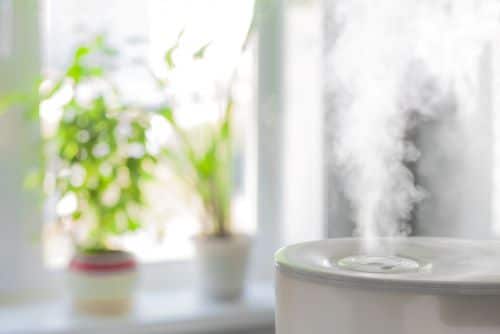This spring, there was hope that summer would save us from the coronavirus.
The theory was that cold and flu viruses dwindle in warm weather, and so would COVID-19.
Of course, it didn’t happen. Summer did nothing to slow the spread.
Now, a new study shows that it’s not temperatures that affect the spread of coronavirus as much as another factor.
The research was published in the journal Aerosol and Air Quality Research. Physicists reviewed 10 studies on transmission of various viruses—including coronavirus—in indoor environments.
They found that low humidity leads to more people being infected.
Dr. Ajit Ahlawat was one of the study authors. He said that if the humidity of indoor air “is below 40%, the particles emitted by infected people absorb less water, remain lighter, fly farther through the room, and are more likely to be inhaled by healthy people.”[1]
On top of that, dry air makes the mucous membranes in our noses dry “and more permeable to viruses.”
The scientists recommend that, in addition to wearing face masks and social distancing, raising humidity in homes and buildings should be a basic coronavirus precaution.
Humidity of at least 40% in public buildings and transportation “would not only reduce the effects of COVID-19,” said study co-author Dr. Sumit Kumar Mishra. It would also lessen “other viral diseases such as seasonal flu.”
Dry Air Harms Our Natural Immune Barriers
The findings back up previous research on the spread of respiratory viruses.
Dr. Stephanie Taylor and her colleagues at Harvard University tested variables such as whether subjects got the flu shot, washed their hands, got adequate sleep, came in contact with large numbers of people, worked with the public, had adequate vitamin D, were old, and many more.[2]
The research team was surprised to find that air humidity was the biggest factor in determining whether people got sick from respiratory viruses. Subjects breathing drier air were far more likely to get an infection.
Dr. Taylor explains that dry air is a more efficient carrier of viruses. In dry air, viruses not only travel farther, they survive longer.
“Dry air also harms our natural immune barriers which protect us from infections,” she said. The mucus membranes in our nose and throat are thinner and less protective in dry conditions.
Dr. Taylor also notes research at the Mayo Clinic that tested higher humidity in school classrooms.
Half the classrooms in a school were humidified during the winter. The others were left alone. Sixty-six percent fewer kids in the humidified classrooms got respiratory infections compared to those in the regular dry-air classrooms.[3]
Yet another study, this one published in the Annual Review of Virology, also confirmed that low humidity allows viruses to stay airborne longer.[4]
The review concludes that a humidity of 40% to 60% is ideal for reducing the spread of a virus. “That’s why I recommend humidifiers during winter in buildings,” said Professor Akiko Iwasaki, the study’s senior author.
Dr. Taylor agrees. She noticed a difference when she increased the humidity in her own home by using a humidifier.
“My husband had at least one serious illness each winter,” she said. “Ever since we started monitoring our indoor relative humidity, he has not been sick.”
If you don’t have a humidifier in your home, you can use an inexpensive vaporizer like this one…

They are widely available online and at drug stores for less than $20. Place them in the bedroom of a person who is sick to raise the humidity and help stop viruses from spreading to others.
Editor’s Note: Research shows the standard heart disease treatments—stents and statin drugs—don’t prevent heart attacks. Discover what does. Get the Heart Smart Protocol. It’s a simple, science-backed plan that prevents and treats America’s number-one killer naturally, without drugs or procedures. You’ll find it in our monthly journal, Independent Healing. Go HERE.
Related Articles
Chocolate Lowers Heart Disease Risk, Study Finds
The Fruit that Works Better than Statins
More Americans than Ever Take Statins…and the Heart Disease Epidemic Keeps Growing
Like this Article? Forward this article here or Share on Facebook.
[1]https://www.eurekalert.org/pub_releases/2020-08/lift-css082020.php
[2]https://www.forbes.com/sites/leahbinder/2019/10/17/harvard-researcher-says-this-inexpensive-action-will-lower-hospital-infection-rates-and-protect-us-for-the-flu-season/#6004b1531824
[3]https://journals.plos.org/plosone/article?id=10.1371/journal.pone.0204337
[4]https://www.annualreviews.org/doi/10.1146/annurev-virology-012420-022445

